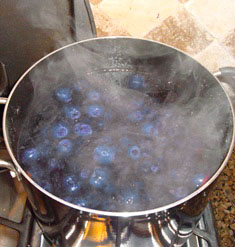 I’m making your Blueberry wine and my question is this. Can I add boiling water to the winemaking ingredients or should I wait for the water to cool first? Thank you
I’m making your Blueberry wine and my question is this. Can I add boiling water to the winemaking ingredients or should I wait for the water to cool first? Thank you
Name: Bill D.
State: Maine
Hello Bill,
The only winemaking ingredients I can think of that should ever touch boiling or hot water are: botanicals and sugar.
- Botanicals: Whenever making wines from herb, flowers, roots, it is normal to blanch them with boiling water. This creates kind of a tea of sorts before going on to the process of actually making the wine.
- Sugar: When adding sugar to a wine must, it is very helpful to pre-dissolve the sugar in hot water, first. By doing this you can be sure the sugar is dissolved. This also makes it much easier to mix the sugar evenly throughout the must.
In both of these instances it is critical that the mix be allowed to cool down to 80°F. or less before continuing on with adding other winemaking ingredients.
Here are how some common wine ingredients affected by hot or boiling water:
- Wine Yeast: Some of the yeast cells will start to die at about 90°F. A lot of the yeast cells will die at around 120°F.
- Yeast Nutrient: also known as diammonium phosphate. Depending on the pH of the wine, when heated up to around 150°F or higher, the yeast nutrient will begin to partially decompose into ammonia.
- Pectic Enzyme: starting at about 125°F will start to denature, which simply means become permanently inactive or ineffective.
- Wine Tannin: is unable to dissolve and saturate into the wine must at wamer temperatures. Instead, it will drop out as a sediment.
- Sulfites: this includes winemaking ingredients such as: Campden tablets, sodium metabisulfite and potassium metabisulfite. Liquids that are heated are not able to hold sulfites for any length of time. This means if you added a sulfite while the liquid was hot, you will need to add it again after the liquid as cooled.
- Fruit Acids: this includes acid blend, citric acid, tartaric acid and malic acid. These are the only common wine making ingredients that are not affected by hot or boiling water.
As an additional note, if you are blanching your blueberries with boiling water, I would not recommend this. This will tend to separate the tannins and color out of the fruit. This is not something you want to happen at this stage. The best way to treat the fruit is to lightly crush them or chop them. Once you have all the wine making ingredients mixed together, treat the entire wine must with one of the sulfites mentioned earlier.
Bill, you can find more information about the basic winemaking process on our website. This may help you out, as well.
Happy Winemaking,
Ed Kraus
———————————————————————————————————
Ed Kraus is a 3rd generation home brewer/winemaker and has been an owner of E. C. Kraus since 1999. He has been helping individuals make better wine and beer for over 25 years.

Am I correct in assuming that the sugar dissolved in water is the initial water added to the recipe?
ive been adding boiling water to my straberrys to blanch them,then let them cool and add other ingredents,have never had a problem,never tried it any other way.
I wrote this spring about mushroom corks and this is a follow-up. Can you use mushroom caps on wine bottles that were screw top bottles. Do you recommend screw on caps and when. Tom
Judy, there is no reason to heat up ALL the water required for a wine recipe to dissolve the sugar. Just use a little water required to get all the sugar called for dissolved. You can do 1 part sugar to 1 part water. If you want to make a heavy sugar syrup for later use, go with 2 parts sugar to 1 part water.
Tom, unfortunately you can not. The screw cap bottle openings tend to be a little larger, too large for a mushroom cork. The opening sizes also tend to vary from one brand to the next due to the different thicknesses of the glass itself. You may accidentally find a particular screw cap wine bottle that works, but other than such luck that answer is no.
Regarding your comment in your July 18th e-mail newsletter,that you would never add hot water to anything but botanicals or sugar, I would suggest that hot water is often added to crushed fruit such as blueberries or other berries to set the color. Cold water should then be added before beginning the primary fermentation.
Bob, I have no doubt that there is a book out there that suggest such a methodology from days gone by, but there is absolutely no reason to do this. The color is brought out by enzymes produced during the fermentation. Any time you add heat to a fruit, you are promoting oxidation. The first evidence of oxidation is the browning of the color pigmentation in the wine must. If anything heating a fruit will only ruin the color of the wine.